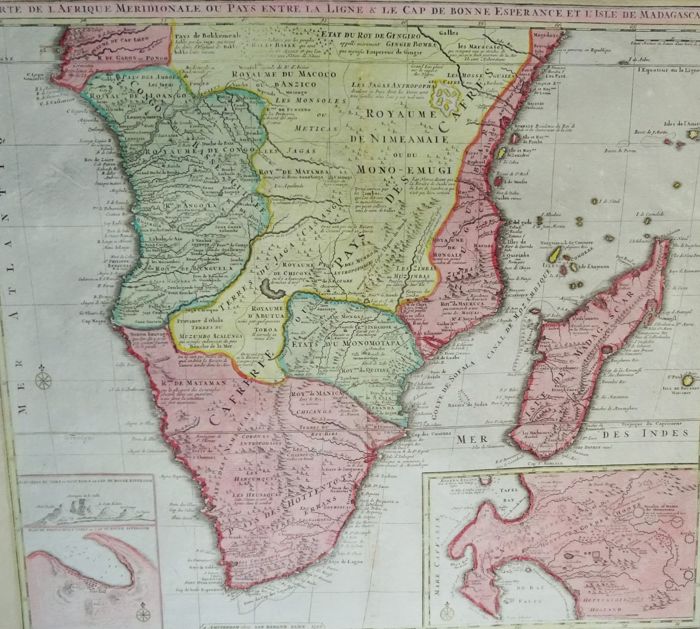1877
An exploration of the Lisbon Geographic Society led by Hermenegildo Capelo begins in Portuguese Angola and will end in Portuguese Mozambique after mapping the Kwango, Congo, Zambezi, Kunene and other rivers.


An exploration of the Lisbon Geographic Society led by Hermenegildo Capelo begins in Portuguese Angola and will end in Portuguese Mozambique after mapping the Kwango, Congo, Zambezi, Kunene and other rivers.

The Kaarta Kingdom (pic: a Kaarta man and woman) on the Senegal River, is attacked by French forces tasked with eliminating obstacles to the French colonisation of West Africa. The Kaarta leader Almany Niamody is killed in the fighting. The Kaarta kingdom will be incorporated into the Khasso Kingdom that has already become a French Vassal state (officially a protectorate kingdom). The Khasso Kingdom itself will be incorporated into French Sudan in 1880.

The highest temperature ever recorded in Africa is 55°C (131°F), at Kebili, Tunisia.

South Africa’s government adds to its apartheid plan to separate races by introducing The Population Registration Act, which places all South Africans into three categories: white, coloured (mixed race) and black. Black South Africans are now required to carry passports to travel inside their own country.

South Africa’s Group Areas Act goes into effect, prohibiting racially-integrated residential areas. A pillar of the apartheid policies to achieve complete separation of the races, the law leads to the evictions of thousands of black, mixed-race and Indian families from their homes.

The Afrikaner nationalist, white supremacist group Afrikaner Weerstandsbeweging is formed in South Africa. In the 1990s, the neo-Nazi paramilitary organisation will use terror tactics in a failed effort to preserve apartheid, killing many black South Africans.

A protest known as Saba Saba (“seven seven” for the seventh day of the year’s seventh month – or today, 7 July) seeking democratic reform in Kenya after 12 years of autocratic rule by Daniel Arap Moi is brutally suppressed by the police and military. Journalists, human rights activists and others are arrested, and seven demonstrators are killed.

Crown Prince Mohammed Ben Al-Hassan begins his rule in Morocco when he is crowned as King Mohammed VI.

The Treaty for the Establishment of the East African Community goes into effect. The revised regional body (a first attempt lasted from 1967 to 1977) this time proves a durable organisation to advance the economic and security interests of member states.

After a geographic survey by satellite, Africa’s northernmost point is formally declared to be Cape Angela on Tunisia’s Mediterranean coast with the dedication of a monument installed by Tunisia’s tourism authority.

The opening of the Mohammed VI Bridge, a cable-stayed bridge spanning the valley of the Bouregreg River near Rabat, Morocco. Named after Morocco’s ruler, the bridge is the centrepiece of a 41.5-km Rabat motorway bypass around the capital city.

Germany admits to the mass murder of Namibia’s Herero and Nama people by German colonial soldiers in 1904. Namibian authorities and the affected peoples want Germany to acknowledge that genocide was committed.

Ghana launches its first nano-satellite, GhanaSat-1. Launched today from the International Space Station, during its two years of operation, the device will monitor the environment of Ghana’s coastline, while taking images and collecting atmospheric and other data.

The African Continental Free Trade Area (AfCFTA) is officially launched in Niger, to the applause of the assembled 32 African heads of state. 17 years of negotiations went into the treaty that will boost intra-Africa trade and job growth. Some countries must still ratify the treaty in order to join.

The Somali movie The Gravedigger’s Wife is released. The drama, directed by Khadar Ayderus Ahmed, is acclaimed by film critics.


Congolese guitarist, in Mikalayi, French Congo. The virtuoso guitarist, admired by other guitarists like Jimi Hendrix, invented a way of playing that became standard for Congolese pop music, of which he is considered one the founding fathers. His band L’Orchesra African Fiesta transcended nationalities and was one of Africa’s most popular in the 1960s.

South African guitarist and singer, in Durban, South Africa. Although classified under South Africa’s apartheid system of racial segregation as Coloured because of his mixed-race parents, the first album from his group The Flames in 1968 produced a hit that played on white South African radio for 13 weeks. He joined the classic American rock and roll band The Beach Boys in the early 1970s, after the group’s leader Brian Wilson heard The Flames. In 1997, he joined the Rolling Stones as backing vocalist, percussionist, and acoustic rhythm guitarist.

South African poet, playwright and author, in Johannesburg, South Africa. His performance poetry and writings confront the complexities of post-apartheid South Africa with anger, even hostility, but always in pursuit of “a world in which we can all breathe.”

Nigerian professional hockey player, in Zaria, Nigeria. He is Nigeria’s first and one of Africa’s first professional ice hockey players. After moving as a child to Canada, he learned and excelled in the sport. He has played for six Canadian and U.S. National Hockey League teams.

Nigerian poet, journalist and cartoonist, in Kaduna, Nigeria. As serious doing satire in comic strips as he is doing investigative journalism, he has worked in extensively in traditional and new media. Twelve of his paintings are part of Nigeria’s National Assembly of Art Collection.